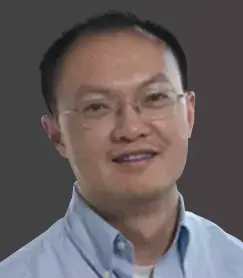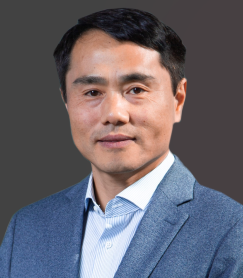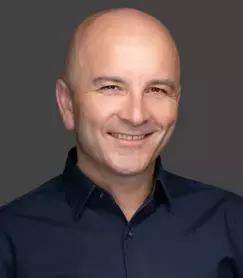
Advisor & Scientific Co-Founder

Advisor & Scientific Co-Founder

Advisor & Scientific Co-Founder

Advisor

Advisor








Professor Deretic is the departmental chair of the Department of Molecular Genetics and Microbiology at the University of New Mexico School of Medicine. Prof. Deretic is an international authority on the role of autophagy in inflammation and immunity. He received his undergraduate, graduate (PhD.) and postdoctoral education in Belgrade, Paris, and Chicago. Prof. Deretic's main contributions to science come from studies by his team on the role of autophagy in infection and immunity. Dr. Deretic is the director of the NIH-funded Autophagy, Inflammation and Metabolism (AIM) Center of Biomedical Research Excellence (CoBRE). The AIM center aims to promote autophagy research nationally and internationally as well as to develop a cadre of junior faculty along with senior experts in this area to study fundamental mechanisms and how autophagy intersects with a broad spectrum of human disease and health state.Prof. Deretic’s lab reported on the role of specific SNAREs in controlling how autophagy terminates - in secretion or degradation. Most recently, Prof. Deretic and colleagues have uncovered the role of cytosolic lectins, termed galectins, in direct control of mTOR and AMPK, the most upstream regulators of autophagy and master regulators of cellular metabolism.

Professor Amaravadi is a physician scientist with expertise in autophagy, conducting early phase clinical trials, and clinically treating cancer patients. He was one of the first to demonstrate that autophagy is a targetable mechanism of resistance in cancer therapy using animal models. Prof. Amaravadi has translated this finding into 9 phase I/II clinical trials testing hydroxychloroquine (HCQ) as a possible autophagy inhibitor and anticancer agent in multiple cancers. These translational studies were the first attempt to modulate autophagy therapeutically in any disease. His laboratory published the first evidence that autophagy is elevated in melanoma patient tumors and predicts poor survival. His work on the role of autophagy in melanoma has identified ER stress associated autophagy as a resistance mechanism to BRAF inhibitors. Working with collaborators in Chemistry, his lab has designed, synthesized and characterized a novel autophagy inhibitor Lys05, which is more potent than HCQ in animal models. Prof. Amaravadi is also a recognized melanoma medical oncologist and phase I trialist who has served as the site PI or co-investigator on melanoma clinical trials involving BRAF inhibitors, and first in human phase I clinical trials of novel cancer agents. In 2013 he was appointed co- Leader of the Cancer Therapeutics Program of the Abramson Cancer Center. In 2015 he was inducted into the American Society of Clinical Investigation. In 2021 he became co-Director of the Wistar/UPenn Skin SPORE.

Duojia (DJ) Pan is a Co-founder of Tasca Therapeutics Corp. As a faculty member at UT Southwestern Medical Center (1998-2004 and 2016-present) and Johns Hopkins University School of Medicine (2004- 2016), his laboratory uses a combination of Drosophila and mouse genetics, biochemistry and cell biology to elucidate molecular mechanisms of tissue growth and homeostasis. He is best known for pioneering discoveries on the Hippo pathway, a central mechanism that regulates tissue growth in animals ranging from insects to humans.Using the fruit fly Drosophila as a model, his laboratory systematically decodedmany key components of the Hippo pathway, including its core kinase cascade, the downstream transcriptional machinery, and multiple upstream regulators.His laboratoryfurther established a conserved role for Hippo signaling in mammalian tissue growth, regeneration and tumorigenesis, and elucidated the molecular mechanism by which the classic tumor suppressor and human disease gene NF2/Merlin controls tissue growth. These discoveries paved the way for ongoing efforts to target the Hippo pathway in cancer and regenerative medicine.
Dr. Pan is currently Bashour Distinguished Chair of Physiology at UT Southwestern Medical Center, and an Investigator of the Howard Hughes Medical Institute. He receivedBachelor’s degree in Biochemistry from Peking University, PhD. in Biological Chemistryat UCLA and postdoctoral training in Genetics at UC Berkeley. He is a recipient of the Paul Marks Prize for Cancer Research (2013) and the Passano Award (2022). Prior to Tasca, he has served on the scientific advisory board of Peloton Therapeutics, an oncology drug discovery and development company that was acquired by Merck & Co.

Dr. Xu Wu is co-founder and a Director of Tasca Therapeutics Corp. He has more than 16 years of experiences in biomedical research and drug discovery in both industry and academia. He is currently an Associate Professor at Massachusetts General Hospital and Harvard Medical School. His lab pioneered in chemical biology of protein autopalmitoylation and developmental signaling pathways (Hedgehog, Wnt and Hippo pathways), and used novel chemical tools to identify functions of protein lipidation in cell signaling and diseases. He has also rich experiences and expertise in cancer drug discovery, stem cell biology and cell signaling. His lab discovered metabolic and lipid regulators of Hippo signaling, and revealed autopalmitoylation of TEAD protein, opening a new door to "drug the undraggable proteins". Prior to joining the faculty of MGH/HMS, he was a Director of Biological Chemistry at Genomics Institute of Novartis Research Foundation (GNF)/Novartis Institutes for Biomedical Research (NIBR). He supervised multiple preclinical and clinical programs, and was responsible for chemical biology and medicinal chemistry discovery programs with multiple programs advanced into clinicaltrials. He directly discovered and developed FDA-approvedOdomzo® (sonidegib).
Dr. Wu completed his PhD. in Chemistry from the Scripps Research Institute, and his B.S. in Chemistry from Peking University, China. He is a recipient of many awards, including American Cancer Society Research Scholar award, and the Sam Fisher Memorial–Melanoma Research Alliance (MRA) Established Investigator award.

David E. Fisher, MD, PhD is an internationally known researcher, clinician and academic, who is Chief of the Massachusetts General Hospital Department of Dermatology at Harvard Medical School in Boston, Massachusetts (USA). He also serves as Director of the MGH Cutaneous Biology Research Center and Director of the Melanoma Center at MGH. A Professor of Dermatology and of Pediatrics at Harvard Medical School, Dr. Fisher came to the MGH from the Dana-Farber Cancer Institute, where he previously Directed the Melanoma Program. Dr. Fisher's research has focused on understanding the molecular and genetic events which underlie formation of melanoma as well as skin pigmentation. As a clinician, he has worked to translate these understandings into advances in diagnosis, treatment and prevention of human diseases related to the skin and associated disorders. A graduate of Swarthmore College with a degree in Biology and Chemistry, Dr. Fisher is also an accomplished concert cellist and received a degree from the Curtis Institute of Music in Philadelphia. He received his PhD under Nobel Laureate Gunter Blobel at Rockefeller University and his Medical Degree at Cornell University Medical College under Dr. Henry Kunkel. Dr. Fisher's specialty training in Medicine, Pediatrics, and Oncology were carried out at Harvard Medical School. He recently served for three years as President of the Society for Melanoma Research, the largest international society dedicated to the study of melanoma. Dr. Fisher is co-founder of Tasca Therapeutics and Soltégo.


Dr. Cicmil (Milenko) has over 20 years of experience in drug discovery and development, leading multi-disciplinary scientific/project teams, portfolio strategy, and business development. His deep understanding of biology, especially in inflammation/autoimmunity and oncology matched with his drug development experience across small molecules, biologics and peptides enables him to find creative solutions for challenges faced by early-stage biotechnology startups. He spent much of his career in R&D positions of increasing responsibility within companies such as Ipsen, Fog Pharma, Merck & Co., AstraZeneca, and GE Healthcare contributing to development of multiple drugs such as: Brilinta, Symbicort, and Keytruda.
Milenko is Co-founder of Tasca Therapeutics Corp., one of the Cure Ventures portfolio companies where he currently serves as the CEO and Board member. Most recently Milenko was Vice President and Head of Global External Innovation at Ipsen, responsible for developing and leading effort generating a high-value pipeline. Prior to joining Ipsen, Milenko was Vice President, Biology at Fog Pharma, where he was responsible for scientific, strategic, and operational leadership of the Biology Department as well as contributing efforts towards the company’s financing. During his career at Merck & Co., in addition to his R&D role Milenko also served as a Director at Merck’s Innovation Hub where he led search & evaluation efforts for in-licensing/partnership opportunities in Immuno-Oncology, Immunology and Ophthalmology. Milenko’s early R&D career at AstraZeneca spanned a variety of roles including managing teams of scientists and projects within immunology and inflammation therapy areas delivering over 20 clinical development candidate drugs.
Milenko is currently a Visiting Research Fellow at University of Reading, UK where he completed a PhD. in Molecular Pharmacology. Milenko received BSc in Molecular Biology from Kings College, London, UK. Prior to joining the pharmaceutical industry, Milenko was a postdoctoral fellow at the Cancer Research UK.

Dr. Vath brings a 30 plus year history of success launching and running new programs in organizations ranging from early-stage start-ups through commercial-stage public biotechnology companies. He has been a Venture Partner at Cure Ventures since 2021. Prior to that Dr. Vath was managing partner for Pharmup Solutions which is a consultancy which serves early-stage startups and established companies to take projects from an idea or research stage to a clinical stage of development. He has also been served as CEO of Response Therapeutics he founded which is an early-stage start-up looking to leverage the integrated stress response for metabolic and inflammatory diseases.
From 2006-2019 Dr. Vath served in several roles at Zafgen, Inc., a company he founded where he led the aspects of the discovery and development organization. Dr. Vath ran Zafgen for the first seven years as a virtual company through clinical proof-of-concept and a public offering and was responsible taking the company’s lead asset through clinical proof-of-concept and discovering three additional novel molecules that were taken to IND stage and crafting Zafgen’s IP portfolio of over 75 patents.
From 2004-2006 Dr. Vath was involved in several early-stage start-up companies as consultant, employee, or founder. These include a stem-cell company focused on oncology called Zhealix which merged with Fate Therapeutics and Phylogix which was a venture-backed start-up developing a plant derived lectin for oncology supportive care as senior VP of Development.
Prior to his work with early-stage start-ups, Dr. Vath was a key contributor at three public biotechnology companies in the Boston area. From 1999-2004 at Praecis Pharmaceuticals, a small molecule and peptide mimetic company, he was the Head of Research where he led an 80 person R&D organization through three INDs and an approved NDA for Plenaxis. From 1996-1999 Dr. Vath was Head of Protein Technologies for Millennium Pharmaceuticals, a pioneer in genomics, where he founded the first proteomics platform in the pharmaceutical industry and contributed to target validation and screening efforts. From 1989 to 1996 Dr. Vath was at Genetics Institute as a Lab Head where he pioneered the application of mass spectrometry for characterizing protein structure-function. In this role he took multiple projects from a candidate stage into development and provided critical information for the market approval of five different therapeutic protein drugs.
Dr. Vath’s academic background includes a PhD. in chemistry from the Massachusetts Institute of Technology where he studied under Prof. Klaus Biemann, and a BS in chemistry from Northeastern University where he graduated with highest honors. He is author on over 30 scientific papers and the inventor on over 25 issued patents.
